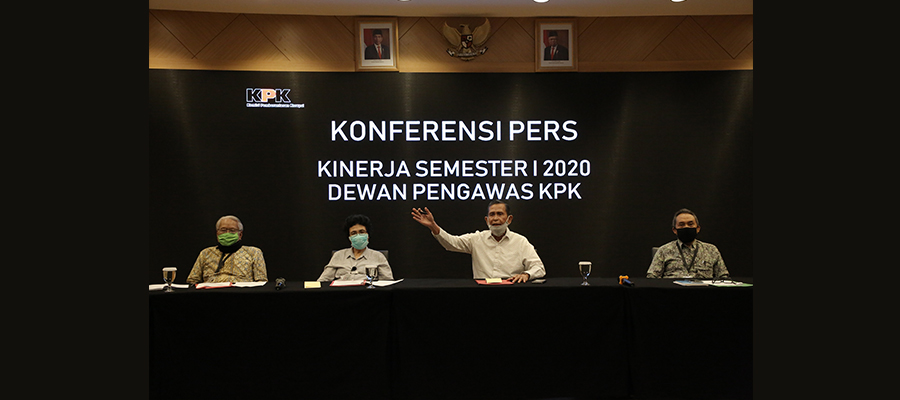Jakarta, 4 August 2020. The Supervisory Board of Indonesia’s Corruption Eradication Commission (Dewan Pengawas KPK) keeps carrying out its duties as mandated by Article 37B of Law Number 19 of 2019 on the Corruption Eradication Commission. This piece of legislation mandates the KPK Supervisory Board to perform four main duties.
First, the Board must supervise the performance of KPK’s duties and authority. Second, the Board has the authority to permit or not to permit KPK to perform wiretapping, search, and/or seizure.
Third, the Board is tasked with preparing and issuing code of ethics, receiving and processing reports on any alleged violation of the code of ethics by KPK leaders or employees, and holding trials to investigate such allegations. Fourth, the Board must carry out evaluation of KPK leaders and employees’ performance on a regular basis.
“We encourage the general public to help us supervise KPK, and in fact we really need people’s support in this. It’s because, ultimately, KPK is responsible to the public. Thus, it is important for us all to perform this supervision together,” said Tumpak Panggabean, Chairman of the KPK Supervisory Board, during an online press conference today (4/8).
Throughout Semester I/2020, the Supervisory Board received and processed 14 cases of alleged ethics violation which came from reports filed by various parties, both inside and outside KPK. According to Tumpak, the Board would hold ethics trials on several cases of alleged ethics violation in August 2020.
During the first half of 2020, KPK Supervisory Board received and processed 105 reports on the performance of KPK’s duties and authority. These reports ranged from blocking of bank accounts in relation to an alleged criminal act of corruption to protracted processing of cases such as the R. J. Lino case.
As part of their supervisory function, the Supervisory Board held two Supervisory Coordination Meetings on 27 April 2020 (the First Quarter Meeting) and 23 July 2020 (the Second Quarter Meeting).
In the Second-Quarter Meeting, the Board heard KPK Commissioner’s report on KPK’s treatment of issues or problems which had been pointed out and discussed in the First-Quarter Meeting. Then, along with the KPK Commissioner, the Board determined 20 new issues or problems to be addressed by the KPK Commissioner and his team.
In terms of its function as the grantor of permits, during the first half of 2020, KPK Supervisory Board received 234 permit requests. These consisted of 46 wiretapping permits, 19 search permits, and 169 seizure permits.
“We granted all those permits within a period of less than 24 hours. In general, the Supervisory Board can complete the process of granting permits in just around 4 to 6 hours,” said Tumpak.
Public Relations Bureau
Corruption Eradication Commission
Jl. Kuningan Persada Kav 4, Jakarta Selatan
KPK Call Center: 198
(021) 2557-8300


